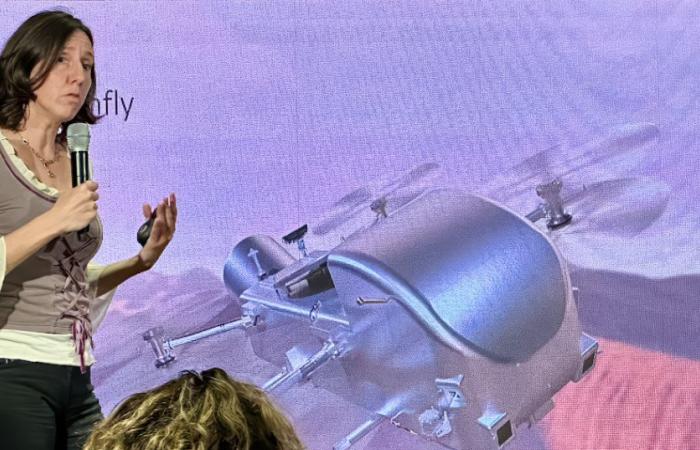Share the post “Private space, public space… a new balance to build in the cosmos”
During the event “2050 we are_ TOMORROW”, Caroline Freyssinet presented the challenges of a space in full transformation, where States and private companies are now competing to conquer and exploit space resources. An astrochemist and research fellow at the CNRS, her work at Latmos (Laboratoire Atmosphères, Observations Spatiales) consists of both searching for traces of extraterrestrial life and designing instruments for the exploration of Mars or even Titan, Saturn’s moon.
With a pragmatic vision, Caroline Freyssinet took to the stage to talk about the future of space. From the outset, she emphasized that “Space is becoming the new horizon of international competition, with major scientific, economic and strategic challenges”. A finding which calls for a rebalancing of roles between public authorities and private companies in this area.
Space, the new playground for the great powers
Caroline Freyssinet recalled that, since the Cold War, space has been the scene of fierce competition between major powers, mainly between the United States and the Soviet Union. Today, the dynamics have changed, with players such as China and India gaining strength. “Space is no longer the preserve of the great historical powers; we are witnessing a multiplication of space programs, including on the part of emerging nations”she explained. Geopolitical issues are diversifying, creating an unprecedented terrain of technological and economic confrontation.
At the same time, space is no longer just under the influence of governments. Private companies like SpaceX and Blue Origin have become central players in this new space age. “What we are seeing today is the emergence of the private sector in what was for a long time the reserved domain of States. This competition is now as much economic as scientific, with gigantic opportunities in terms of exploitation of space resources.”
From conquest to exploitation: the new economic challenge
For Caroline Freyssinet, the real challenge of this new space era is no longer just the conquest, but the exploitation of resources beyond the Earth. “It is no longer about sending missions to explore, but about using space resources for economic purposes.” Whether it is to exploit rare metals present on asteroids, to take advantage of solar energy in orbit or to multiply the communications satellites, the economic potential of space is immense.
These resources could also play a key role in the energy transition. She stressed that “Control of space and its resources could become a factor of economic domination in the future”The technological capabilities of each nation or private company to exploit these opportunities will define the geopolitical balance of power for decades to come.
“Whoever masters the resources of space will dominate the economy of the future.”
After the 1967 Space Treaty, a new legal and ethical framework must be invented
Although the opportunities are immense, Caroline Freyssinet warns of the risks of anarchic development if the legal frameworks do not adapt to the new spatial reality. “The 1967 Outer Space Treaty, which prohibits the militarization and territorial claims of space, is now obsolete. It no longer offers adequate responses to private ambitions and technological developments.”
It calls for strengthened international cooperation to avoid a new race for resources without clear regulations. “If we do not want space to become a new battlefield for resources, we must quickly establish rules to guarantee peaceful and shared use of these new territories.”
Cooperation: a key to the space future
Despite growing tensions between states and private actors, Caroline Freyssinet remains convinced that international cooperation is essential to meet the challenges posed by space. She believes that space exploration must be seen as a collective adventure, where collaboration between states, companies and scientists will be crucial. “No actor will be able to succeed alone. The key to success lies in synergy between the public and private sectors, as well as close international collaboration.”
Caroline Freyssinet concludes by calling for space to be maintained as a common good of humanity: “It is not about curbing ambitions, but about ensuring that space remains a common good, where innovation can develop in an ethical and sustainable way.” The future of space will depend on the ability of actors to find a balance between competition and collaboration, while preserving the integrity of this new frontier.
SUPPORT WE TOMORROW, SUPPORT INDEPENDENT EDITING
Subscribe to our weekly newsletter
And subscribe to our magazine.






